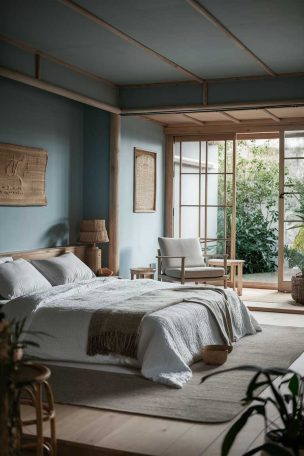In interior design, a style has been capturing hearts and transforming spaces: Japandi.
This modern Japandi bedroom aesthetic blends Japanese minimalism and Scandinavian functionality, creating a serene and stylish look.
Regarding color schemes, blue is a standout choice for Japanese bedroom ideas.
Let’s explore the world of blue japandi bedrooms and how this calming hue can elevate your space.
The Spectrum of Blue in Japandi Bedrooms
Blue is a versatile color that can create various moods in a Japanese-inspired bedroom.
From light and airy to deep and cozy, let’s explore the range of blue hues that work beautifully in Japandi design.
Soft and Serene Blues
Lighter shades of blue can make your bedroom feel like fresh air.
They’re perfect for creating a calming, refreshing, and relaxing atmosphere.
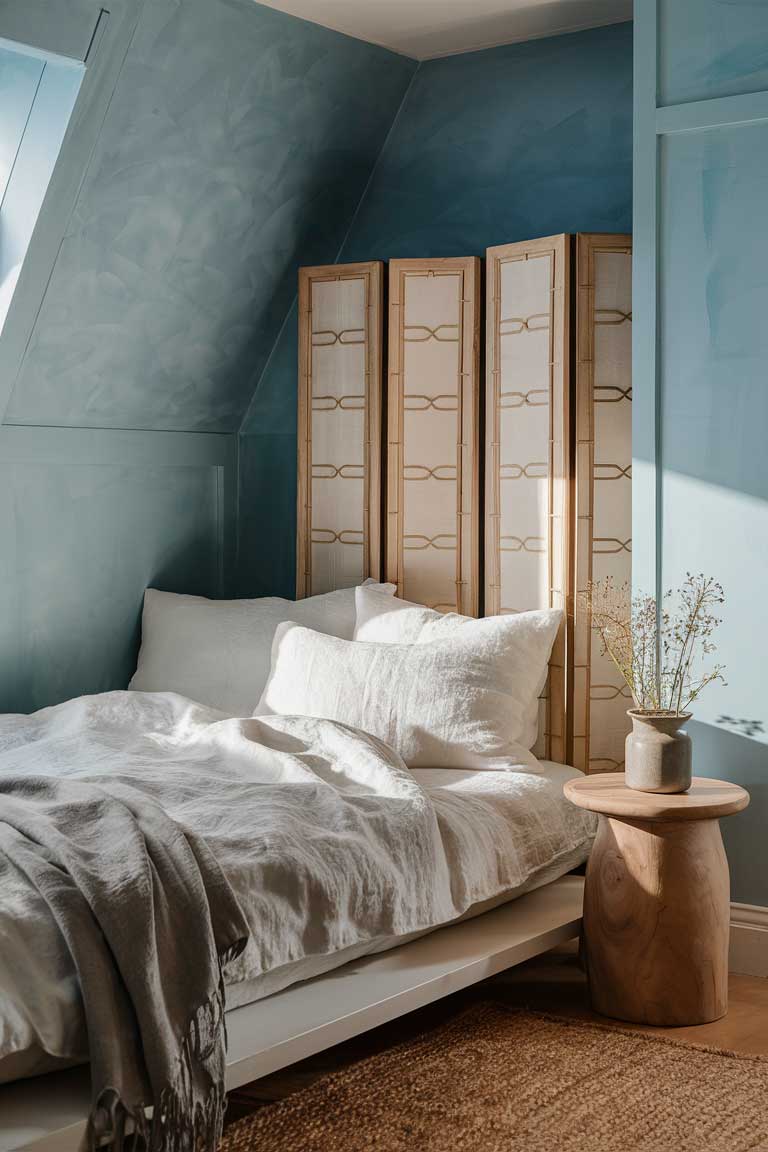
Sky blue, for instance, can transform your room into a tranquil oasis.
Imagine light sky-blue walls, natural wood furniture, and a futon bed dressed in crisp, light linen.
Add paper screens for that authentic Japanese touch, and you’ve got yourself a slice of heaven.
For a slightly different take, consider powder blue. It’s soft enough to be soothing but has enough color to make a statement.
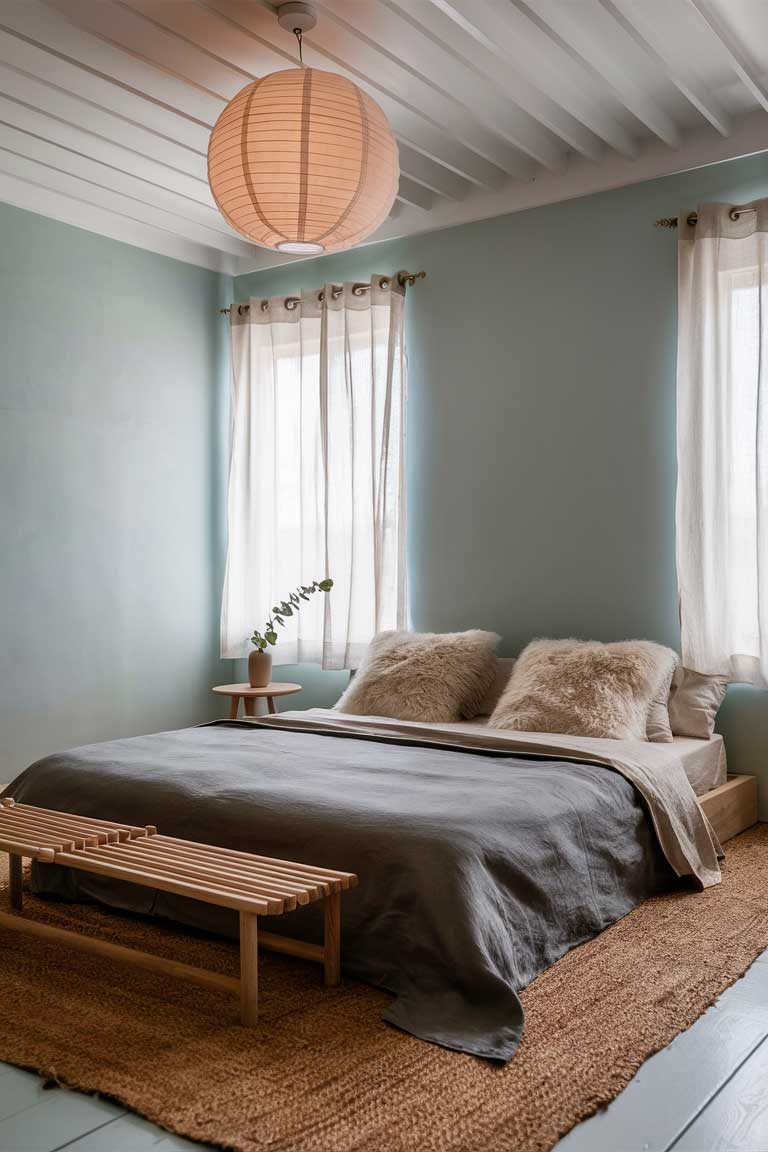
Pair powder blue walls with a charcoal-gray bedspread for a subtle contrast.
Hang a large paper lantern above the bed to add warmth and visual interest.
The result?
A space that’s both cozy and sophisticated.
Deep and Rich Blues
On the other end of the spectrum, deeper blues can create a cocooning effect in your bedroom.
These shades are perfect for those who want their bedroom to feel like a protective sanctuary.
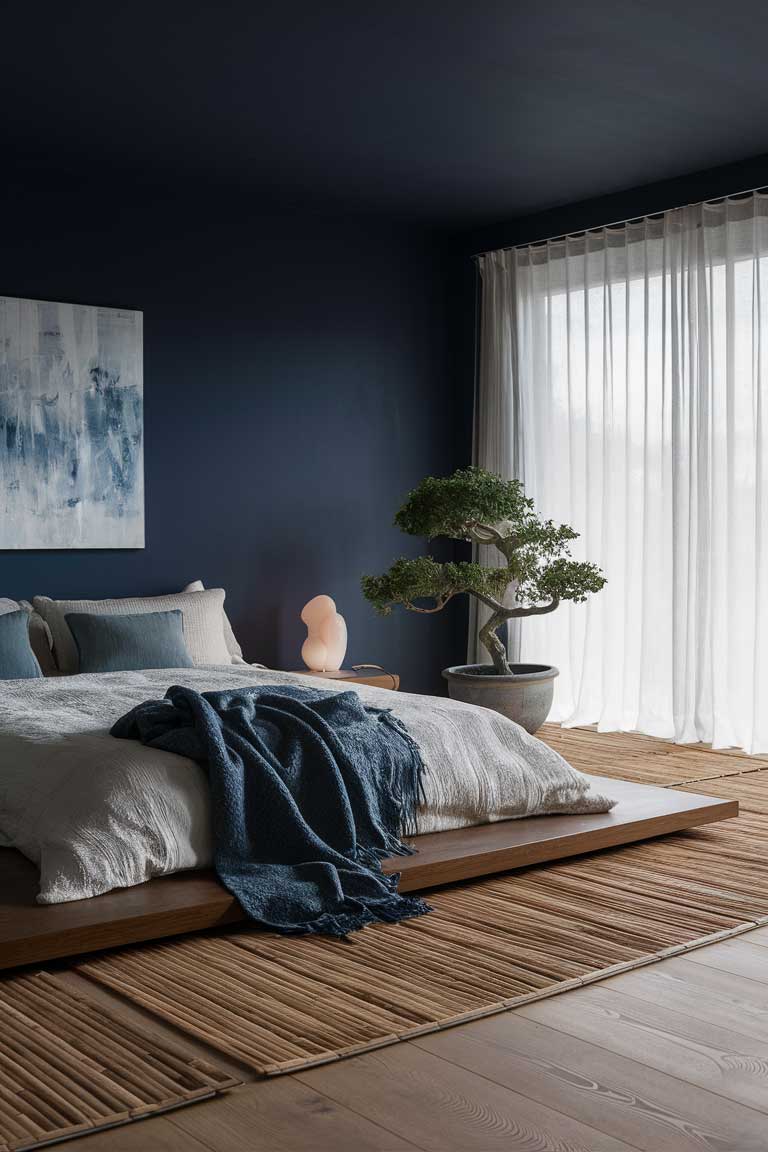
Navy blue, for example, can create a bold and striking look.
Picture a navy blue accent wall behind a low wooden platform bed.
Dress the bed in crisp white bedding and add blue-gray throw pillows for depth.
Natural bamboo floor mats can bring in texture and warmth, balancing out the coolness of the blue.
For a truly immersive experience, consider midnight blue.
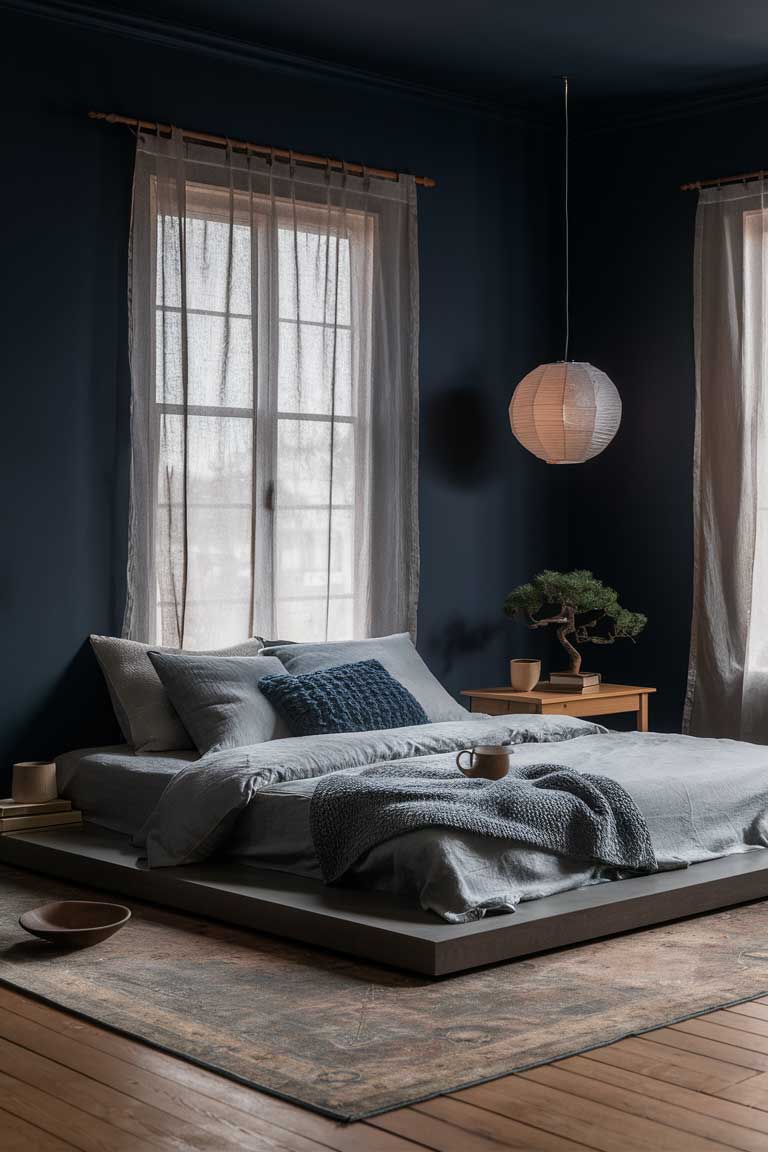
This deep, rich color can envelop your space in tranquility.
Pair it with wooden floors and light gray bedding with indigo accents.
A paper lantern hanging from the ceiling can add a soft, dreamy quality to the room.
Japandi Blue Color Combinations
One of the beauties of Japandi design is its focus on natural materials and neutral colors.
In all its shades, blue pairs beautifully with these elements to create harmonious and balanced spaces.
Blue and Wood
The combination of blue and wood is a match made in Japandi heaven.
The coolness of blue perfectly complements the warmth of wood, creating a balanced and inviting atmosphere.
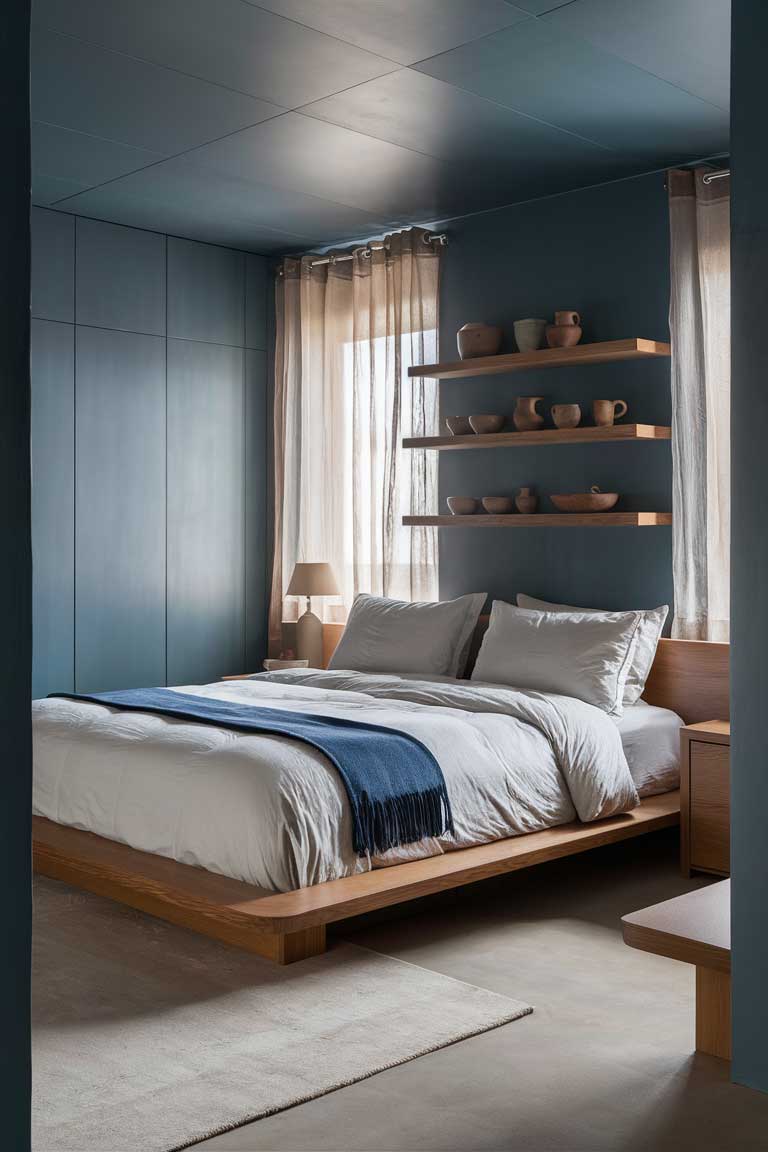
Steel blue walls, for instance, look stunning when paired with natural wood accents.
For a layered look, add crisp white bedding and a deep blue throw.
Wooden floating shelves displaying simple pottery can tie the whole look together.
For a slightly different vibe, try teal blue with light wood.
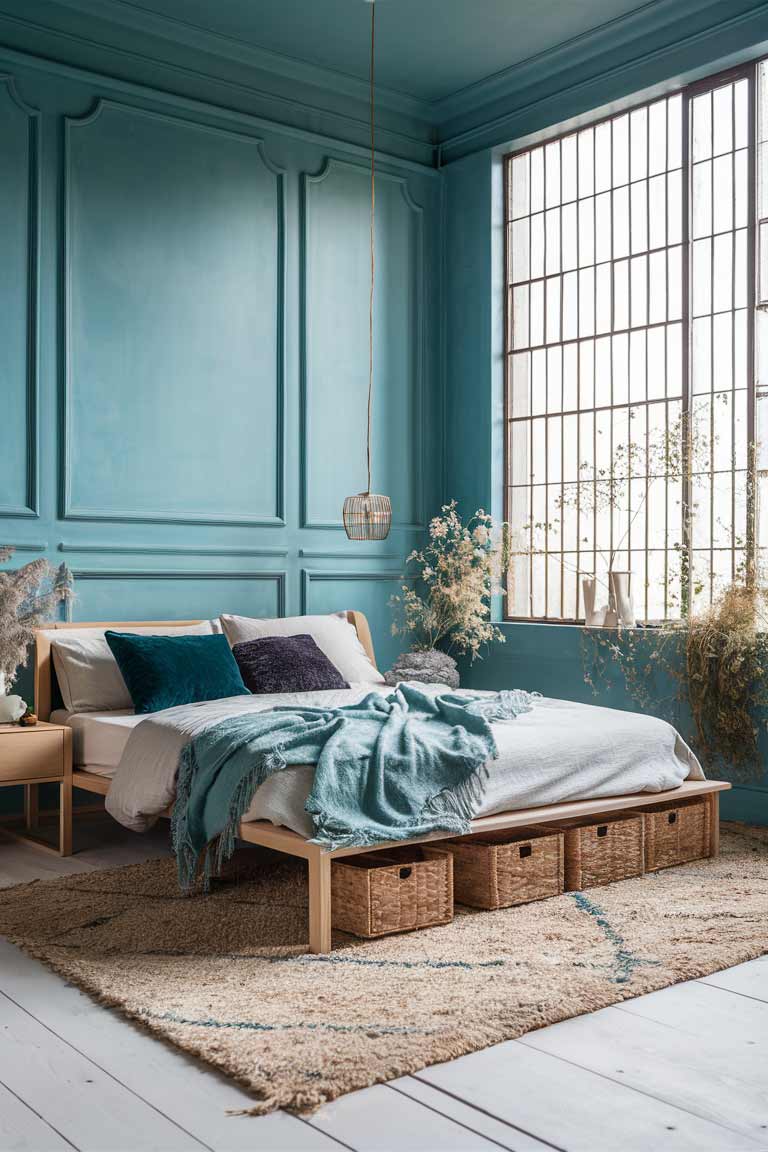
Soft teal blue walls can create a refreshing backdrop for minimalist light wooden furnishings.
Dress the bed in white bedding and add teal and indigo cushions for a pop of color.
Don’t forget to incorporate some woven baskets for storage – they’re functional and aesthetically pleasing.
Blue and Neutral Tones
Blue also pairs beautifully with neutral tones, creating a serene and balanced space that’s quintessentially Japandi.
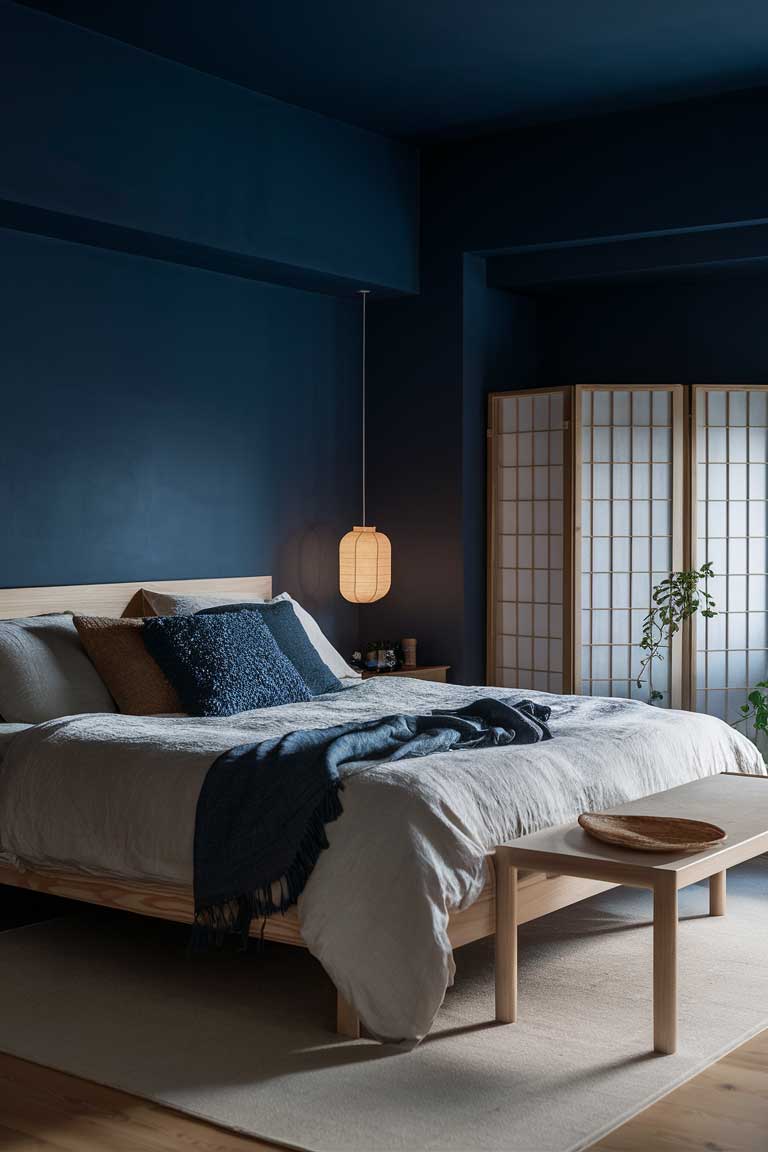
Indigo blue walls can create a stunning backdrop for light wood furnishings.
For a cohesive look, dress the bed in white linen sheets and add indigo cushions.
A shoji screen can add an authentic Japanese touch while providing privacy.
For a lighter take, consider pairing light blue with sandy beige.
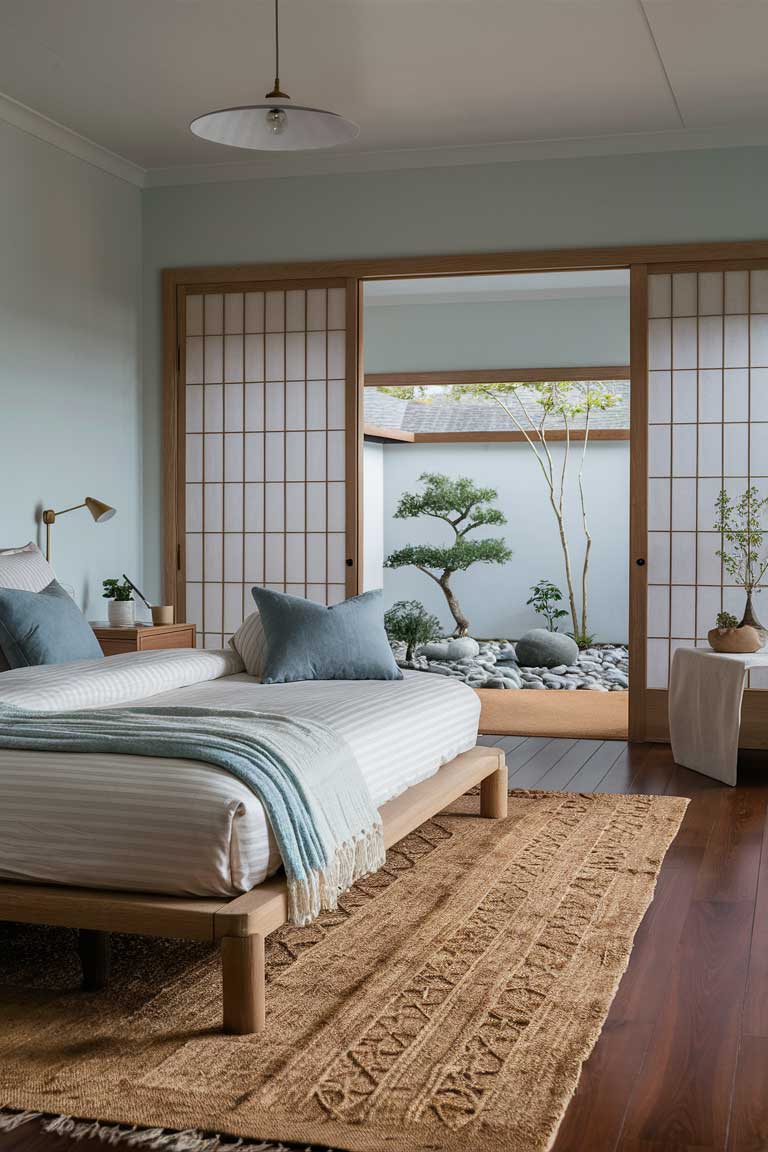
Light blue walls can create a breezy, relaxed atmosphere while sandy beige furniture grounds the space.
A futon-style bed with white and blue striped linens can add visual interest.
Don’t forget to add a handmade woven rug for texture and warmth.
Japandi Blue Bedroom Elements
Now that we’ve explored color combinations, let’s examine the key elements of a blue japandi bedroom.
These elements work together to create a functional and aesthetically pleasing space.
Minimalist Furniture
In Japandi design, less is more.
Furniture should be functional, low-profile, and free of unnecessary ornamentation.
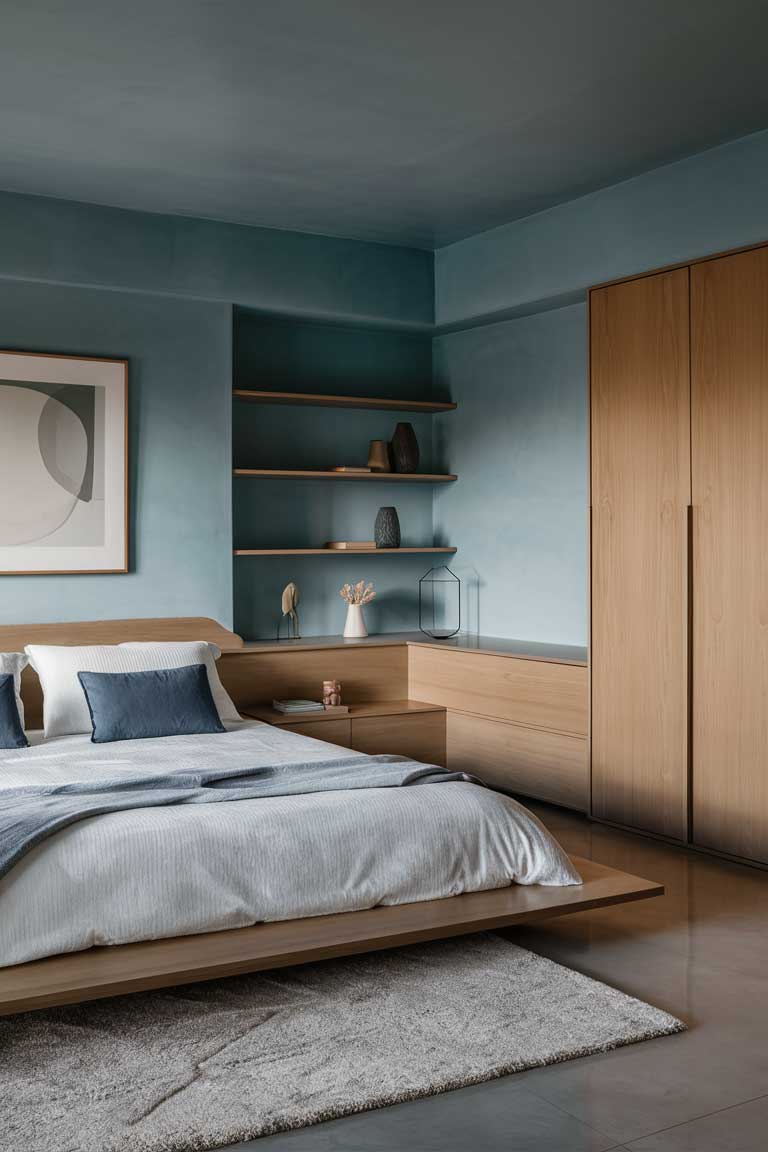
Low-profile beds are a staple in Japandi bedrooms.
Think platform beds, futon-style beds, or even tatami mat beds.
Pair these with simple storage solutions like wooden floating shelves or minimalist wooden wardrobes.
The key is to keep the space uncluttered and peaceful.
Natural Textures
Textures are crucial in adding depth and interest to a Japandi space without compromising its minimalist aesthetic.
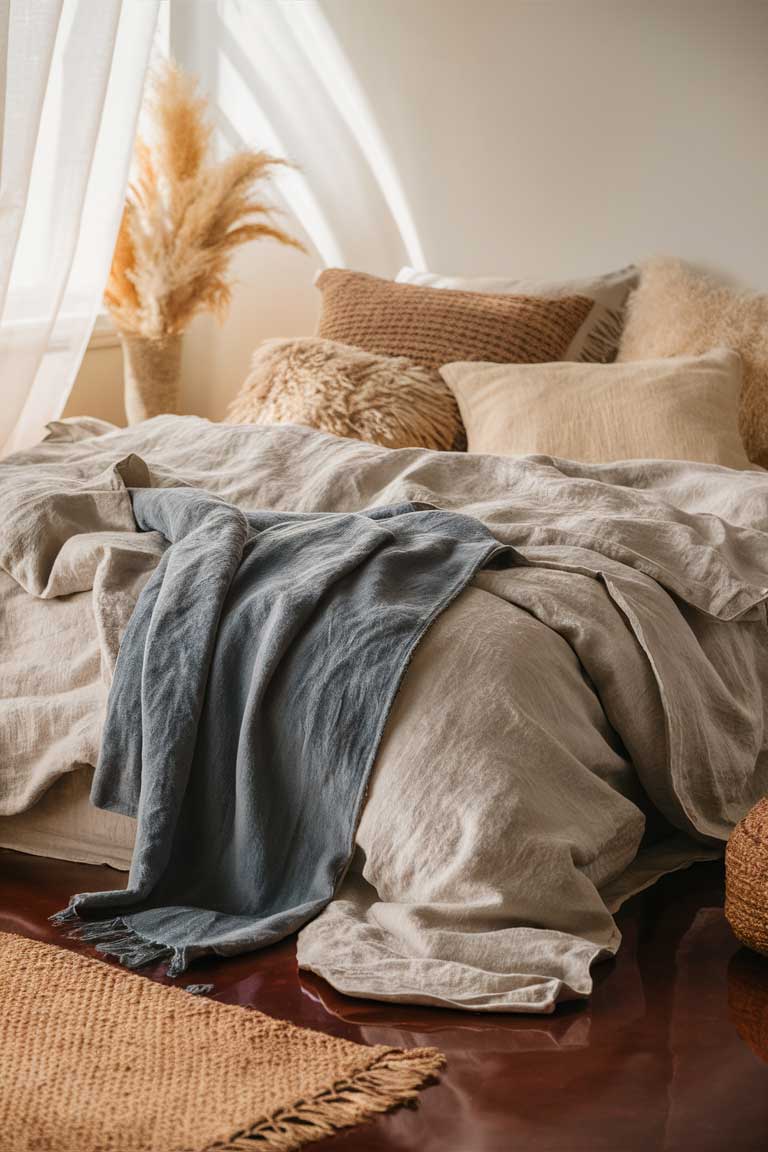
For textiles, opt for natural materials like linen and cotton.
Choose bedding in neutral tones and add interest with indigo throws or cushions.
Natural fiber rugs like jute or sisal work beautifully for floor coverings.
You could also consider bamboo mats or traditional tatami mats for an authentic Japanese touch.
Lighting and Ambiance
Lighting is crucial in creating the right atmosphere in your Japandi bedroom design.
The goal is to create a soft, diffused light that promotes relaxation.
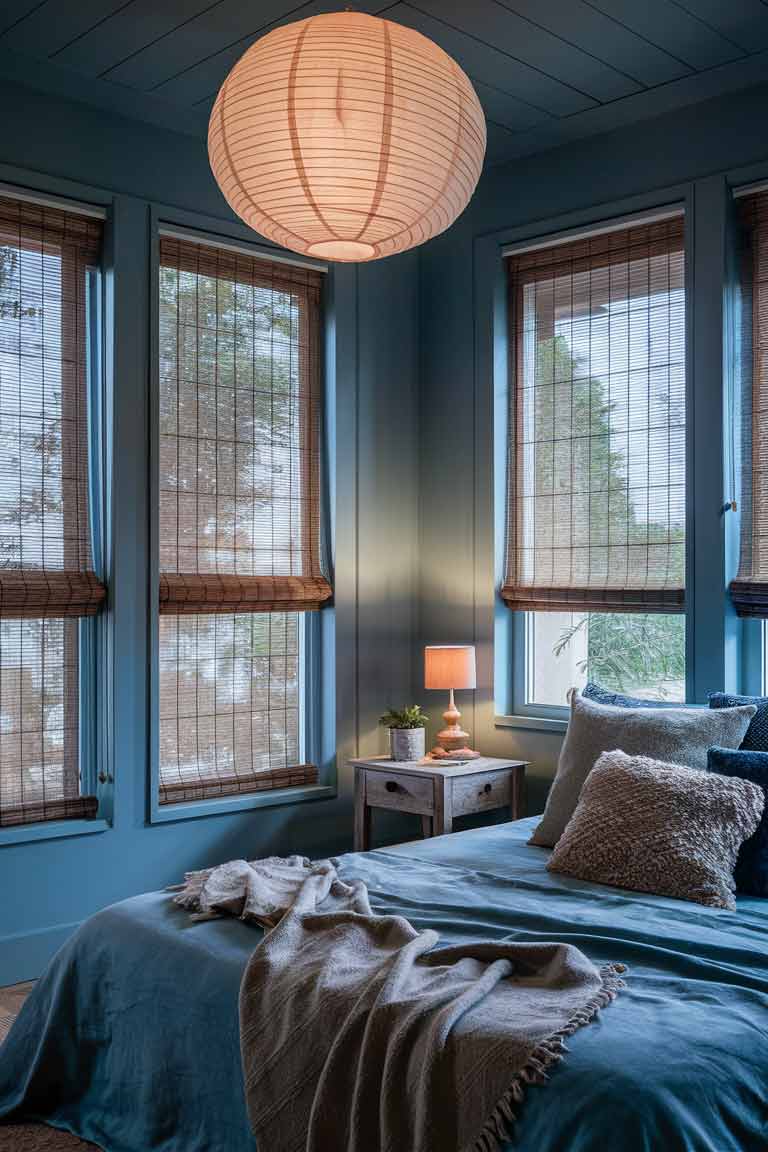
Paper lanterns are a fantastic choice for Japandi bedrooms.
They can be hung from the ceiling or used as table lamps to create a soft, warm glow.
Large windows are ideal for natural light.
Use bamboo blinds or shoji screens to filter the light and create a serene atmosphere.
Plants and Natural Elements
Bringing a touch of nature into your bedroom is a key aspect of Japandi design.
It helps to create a connection with the outdoors and adds life to the space.
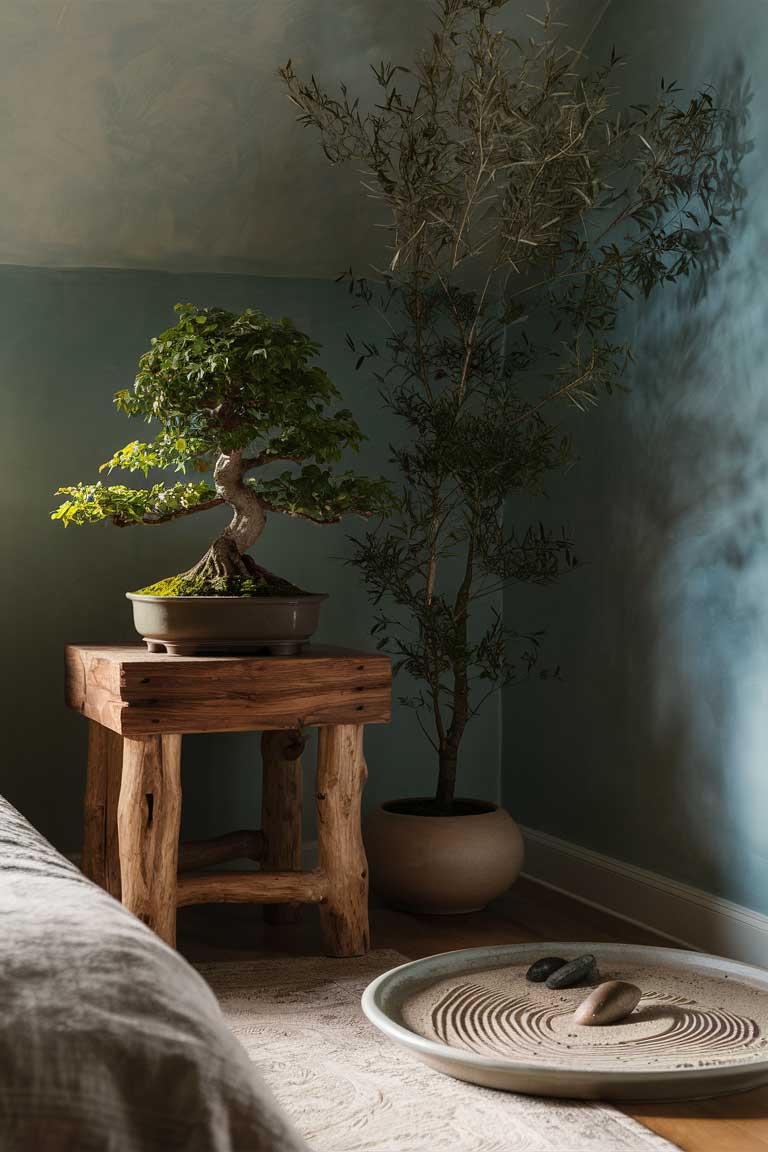
Bonsai trees are a perfect choice for Japandi bedrooms.
They’re small, manageable, and packed with symbolism.
Place one on your bedside table or windowsill for a touch of zen.
You could incorporate other potted plants or create a small Zen garden with raked sand and carefully placed stones.
Japandi Blue Bedroom Layouts
Your bedroom layout plays a crucial role in creating a serene and functional space.
Let’s explore some Japandi-inspired layouts that work beautifully with blue color schemes.
Cozy Nooks
Japandi design often incorporates cozy nooks that make the most available space while creating a sense of intimacy.
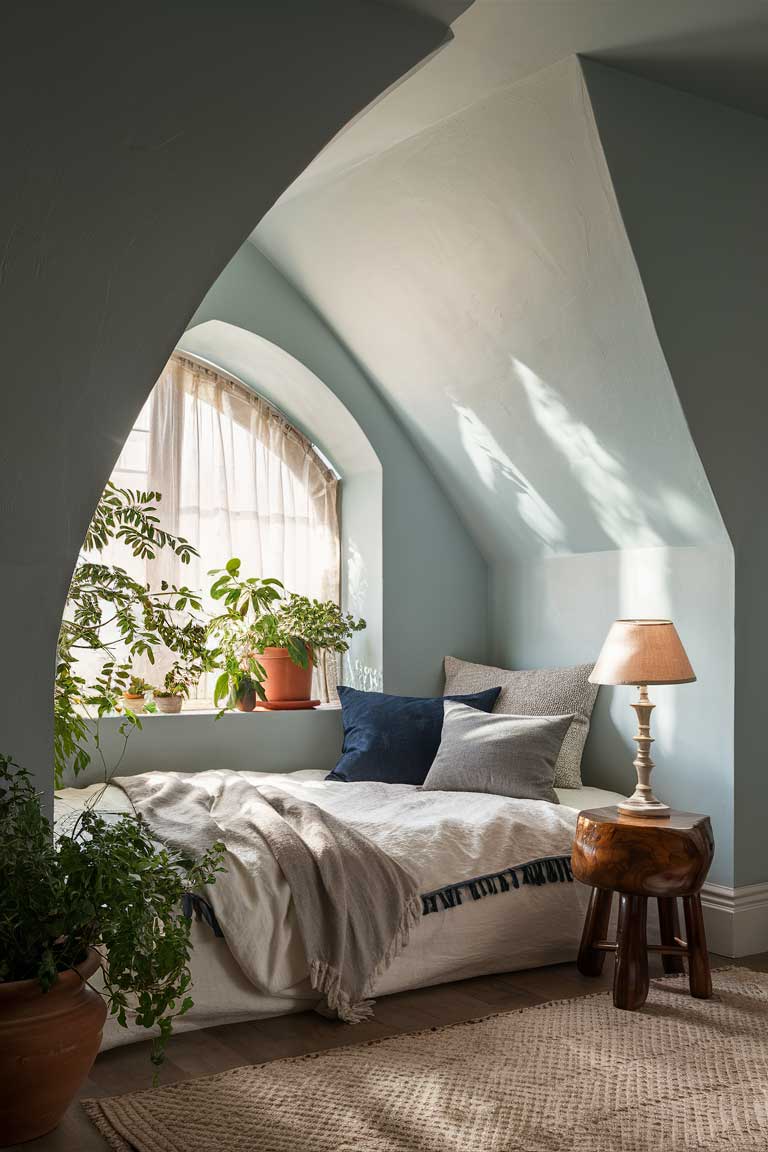
Consider creating a bed nook under a sloped ceiling.
Paint the walls pale blue and tuck a low bed with navy blue cushions into the nook.
For a minimalist touch, use a simple wooden stool as a nightstand.
This layout creates a cozy, cocoon-like sleeping space perfect for relaxation.
Open and Airy Spaces
Conversely, Japandi design also embraces open, airy spaces that create a sense of freedom and connection with the outdoors.
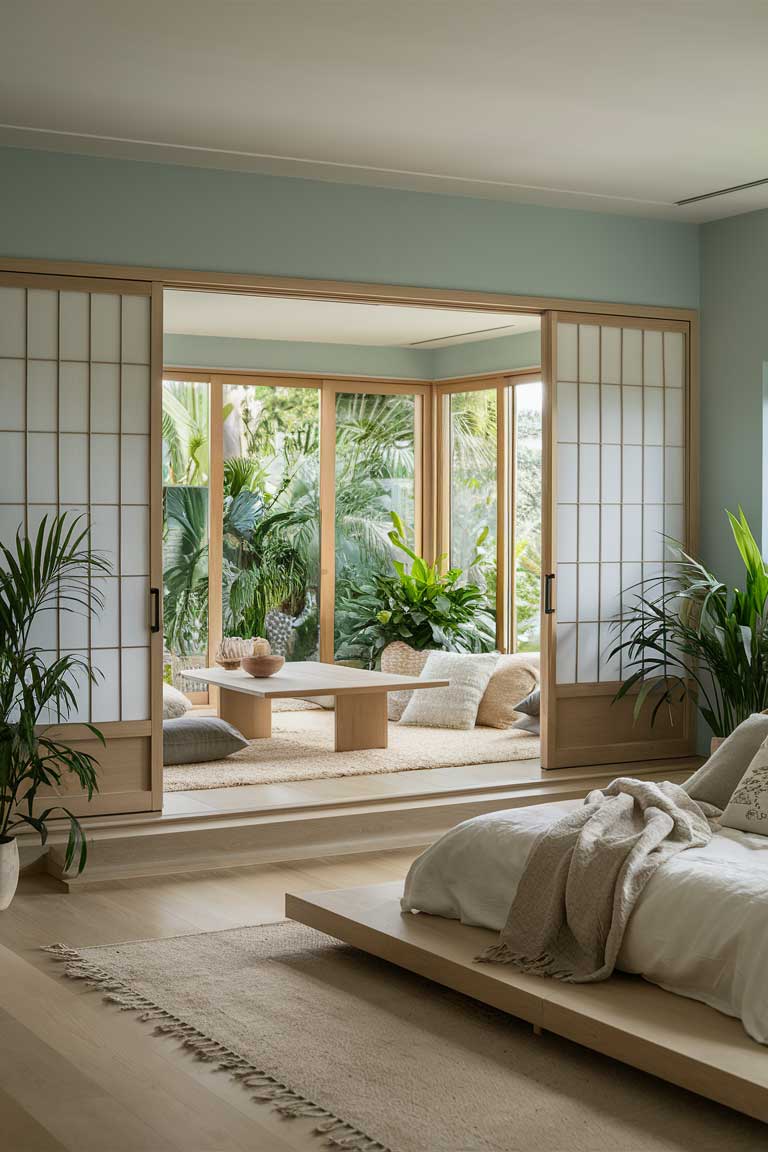
For larger bedrooms, consider a layout that incorporates floor-to-ceiling windows.
This allows plenty of natural light and creates a strong connection with the outdoors.
Center a low wooden platform bed in the room and use sliding shoji doors to create flexible spaces within the room.
This layout creates a sense of openness while maintaining the calm, ordered feel of Japandi design.
Incorporating Wabi-Sabi in Blue Japandi Bedrooms
Wabi-sabi, the Japanese concept of finding beauty in imperfection, is integral to Japandi design.
It adds depth and character to the clean lines and minimalist aesthetic.
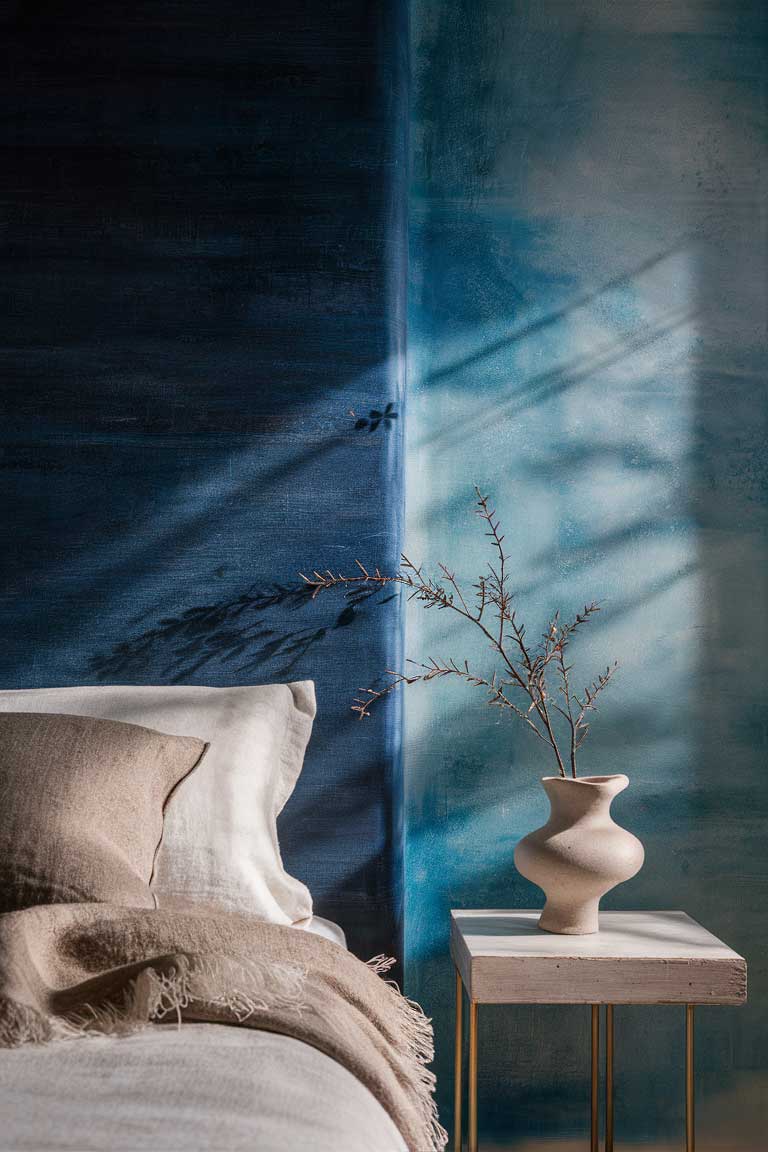
To incorporate wabi-sabi into your blue Japandi bedroom, consider textured walls in subtle blue tones.
These add depth and interest without overwhelming the space.
Use rough linen textiles in natural colors to add tactile interest to your bed.
Handmade pottery with irregular shapes and organic forms can serve as beautiful decorative pieces that embody the wabi-sabi aesthetic.
Conclusion
Creating a blue Japandi bedroom is more than just following rules.
It’s about crafting a peaceful, balanced, and deeply personal space.
Combining the tranquility of blue with the minimalist elegance of Japandi design allows you to create a bedroom that serves as a true sanctuary.
Remember, the key to successful Japandi design lies in balance.
Balance cool blues with warm woods, smooth surfaces with rough textures, and open spaces with cozy nooks.
Don’t be afraid to incorporate elements that speak to you personally – a cherished piece of art, a handmade quilt, or a plant you’ve nurtured.
Ultimately, your blue japandi bedroom should reflect your style and a space that promotes rest and rejuvenation.
So, take these blue bedroom ideas, make them your own, and create a space that feels like home. Sweet dreams!
